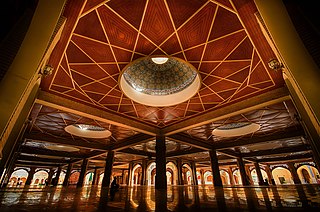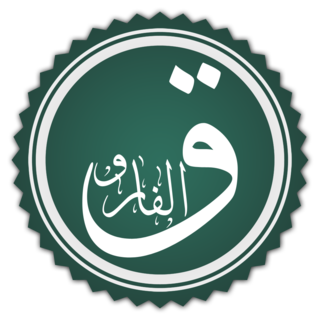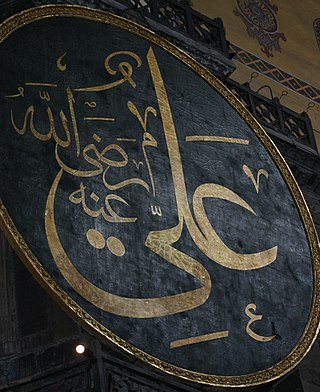
Najaf or An-Najaf al-Ashraf, is the capital city of Najaf Governorate in central Iraq about 160 km south of Baghdad. Its estimated population in 2024 is about 1.41 million people. It is widely considered amongst the holiest cities of Shia Islam and one of its spiritual capitals, as well as the center of Shia political power in Iraq. It is the burial place of Muhammad's son in law and cousin, ‘Alī ibn Abī Tālib. It is a major pilgrimage destination for Shia Muslims. The largest cemetery in the world (Wadi-us-Salaam) and the oldest Shi'a Islamic seminary in the world are located in Najaf.

The Sanctuary of Imām 'Alī, also known as the Mosque of 'Alī, located in Najaf, Iraq, is a mausoleum which Shia and Sunni Muslims believe contains the tomb of 'Alī ibn Abī Tālib, a cousin, son-in-law and companion of the Islamic Prophet Muhammad. The Shī'as consider 'Alī as their first Imām and the first of the twelve caliphs of Muhammad, and the Sunnis regard him as the fourth Sunni Rashid Caliph. According to Shī'ite belief, buried next to 'Alī within this mosque are the remains of Adam and Nuh (Noah). Each year, millions of pilgrims visit the Shrine and pay tribute to Imām 'Alī.

The Rashidun are the first four caliphs who led the Muslim community following the death of Muhammad: Abu Bakr, Umar, Uthman, and Ali.

Kufa, also spelled Kufah, is a city in Iraq, about 170 kilometres (110 mi) south of Baghdad, and 10 kilometres (6.2 mi) northeast of Najaf. It is located on the banks of the Euphrates River. The estimated population in 2003 was 110,000. Currently, Kufa and Najaf are joined into a single urban area that is mostly commonly known to the outside world as 'Najaf'.

Islam is the official religion of the United Arab Emirates. Of the total population, 76.9% are Muslims as of a 2010 estimate by the Pew Research Center. Although no official statistics are available for the breakdown between Sunni and Shia Muslims among noncitizen residents, media estimates suggest less than 20 percent of the noncitizen Muslim population are Shia.

The Grand Mosque is a mosque in Dubai, Emirate of Dubai, United Arab Emirates. It is located between the textile souk and the Dubai Museum close to a small stream in the Bur Dubai area. Originally built in 1900, demolished and built again in 1960, it then underwent a further rebuilding in 1998. It now holds up to 1,200 worshippers. Non-Muslims are permitted to enter the Mosque daily from Sunday to Thursday from 9 AM to 11:30 AM for free tours. The mosque is the hub of Dubai's religious and cultural life.

The holiest sites in Islam are located in the Arabian Peninsula. While the significance of most places typically varies depending on the Islamic sect, there is a consensus across all mainstream branches of the religion that affirms two cities as having the highest degree of holiness, in descending order: Mecca, and Medina. Mecca's Al-Masjid al-Haram, Al-Masjid an-Nabawi in Medina are all revered by Muslims as sites of great importance.

The Al-Abbas Shrine is the mausoleum of Abbas ibn Ali and a mosque, located near the Imam Husayn Mosque in Karbala, Iraq. Abbas was son of Ali ibn Abi Talib and the half-brother of Imam Hasan and Imam Husayn. He was Husayn's flag-bearer in the Battle of Karbala and chief of his caravans. The shrine is revered by the Shia Muslims who visit it every year, especially in the month of Muharram.

Sunni Muslims and Shia Muslims agree on the three holiest sites in Islam being, respectively, the Masjid al-Haram, in Makkah; the Al-Masjid an-Nabawi, in Medina; and the Al-Masjid Al-Aqsa, in Jerusalem.

Shia Islam in Iraq has a history going back to the times of Ali ibn Abi Talib, the first imam of Shia Islam and fourth caliph of Sunni Islam who moved the capital of the early caliphate from Medina to Kufa two decades after the death of Muhammad. In 2015, Shia Muslims made up around 64% of the Iraqi population. Iraq is the location of the holy cities of Najaf and Karbala, pilgrimage sites for millions of Shia Muslims.

The Wahhabi sack of Karbala occurred on 21 April 1802, under the rule of Abdulaziz bin Muhammad Al Saud, the second ruler of the Emirate of Diriyah. Approximately 12,000 Wahhabis from Najd attacked the city of Karbala. The raid was conducted in retaliation against attacks on Hajj caravans by Iraqi tribes and coincided with the anniversary of Ghadir Khumm.
Emirati Iranians or Emirati Persians are residents of the United Arab Emirates of Iranian national background. The community accounts for 5-8% of the country's population and is highly respected for its contributions to the social and economic fabric of the UAE.
Islam is the majority and official religion in the United Arab Emirates, professed by 74.5% of the population as of 2020. 63.3% are Sunni, 6.7% are Shia, while 4.4% follow another branch of Islam. The Al Nahyan and Al Maktoum ruling families adhere to the Maliki school of jurisprudence. Many followers of the Hanbali school are found in Sharjah, Umm al-Quwain, Ras al-Khaimah and Ajman. Their followers include the Al Qasimi ruling family. The other main religions present in the country include Christianity (12.9%), Hinduism (6.2%), and Buddhism (3.2%). Zoroastrians, Druze, Baha'i, Judaism, and Sikhism are also practiced by some non-nationals. 1.3% of the population is agnostic.
The Qatif and Dammam mosque bombings occurred on 22 and 29 May 2015. On Friday May 22, a suicide bomber attacked the Shia "Imam Ali ibn Abi Talib Mosque" situated in Qudeih village of Qatif city in Eastern Province, Saudi Arabia. The Islamic State claimed responsibility for the blast, which killed at least 21 people. The event is the second deadly attack against Shia in six months.

Shia Islam is practiced by a minority of Muslims in the United Arab Emirates. It is also practiced among expatriate Muslim communities living in the country, most notably Iranians, as well as some Arabs, Pakistanis, Indians, and other nationalities. Non-Twelver Shia branches such as Ismailis and the Dawoodi Bohras are also present in the UAE and account for less than 5% of the total population. Shia nationals are concentrated in the city of Dubai, belonging mostly to the latest (1920s) wave of migrants who managed to obtain citizenship.

The Iranian Mosque located in Satwa, Dubai, is a Shia mosque founded by the Iranian community.

The Dubai Textile Souk is a traditional souq (market) of textile products in Dubai's historic Bur Dubai neighbourhood, along the Dubai Creek. It is located in the United Arab Emirates. Opposite to the textile souk on the other side of the Dubai Creek lie the Dubai Spice Souk and Dubai Gold Souk in Deira, accessible via the creek by special abra boats. It is open 10am to 10 pm Saturday to Thursday with some vendors taking a lunch break from 1-4pm and Friday is 4 pm to 10pm only. The souks of Dubai have a rich history of trade within the Persian Gulf region and have developed over time as Dubai urbanised rapidly.

Al-Farooq is the title given to one who distinguishes right from wrong. It was a well-known historical title of the second Caliph Umar.

Ali ibn Abi Talib, the fourth Rashidun caliph and the first Shia Imam, was assassinated during the morning prayer on 28 January 661 CE, equivalent to 19 Ramadan 40 AH. He died of his wounds about two days after the Kharijite dissident Ibn Muljim struck him over his head with a poison-coated sword at the Great Mosque of Kufa, located in Kufa, in present-day Iraq. He was about sixty-two years of age at the time of his death.

The following outline is provided as an overview of and topical guide to Dubai.
















